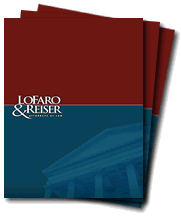Chapter 7 Bankruptcy Attorneys New Jersey
 Chapter 7 bankruptcy is often referred to as a liquidation bankruptcy. It is designed for individuals or corporations in financial distress who do not have the existing ability to repay their debts. An individual filing a Chapter 7 bankruptcy petition can eliminate credit card debt, stop creditor lawsuits, wage garnishments or bank levies, prevent repossession, and put an end to harassing collection calls and letters from creditors and collection agencies.
Chapter 7 bankruptcy is often referred to as a liquidation bankruptcy. It is designed for individuals or corporations in financial distress who do not have the existing ability to repay their debts. An individual filing a Chapter 7 bankruptcy petition can eliminate credit card debt, stop creditor lawsuits, wage garnishments or bank levies, prevent repossession, and put an end to harassing collection calls and letters from creditors and collection agencies.
Two initial steps to determine whether Chapter 7 bankruptcy is a viable option for individuals and couples.
- Property Value.
In any bankruptcy filing, you must list all of your assets and their value, but you are allowed to claim certain property as exempt. If your property has value beyond the allowed exemptions the trustee (appointed by the court to administer the case) may sell such assets and distribute the proceeds among the unsecured creditors.
- Income.
The other relevant criteria is a review of your income. There is a good faith requirement under the Bankruptcy Code, and a financial “means test” designed to determine if you are qualified to file a Chapter 7. This is an involved test that reviews your income in comparison to similar households, and also reviews your expenses. At the end of the calculation, the test may determine that you have to file a Chapter 13 (the repayment bankruptcy) and pay a percentage or all of your debt.
How long will it take me to payoff my debts without a bankruptcy filing? Try our free bankruptcy debt calculator
NOTE: Please only use numbers in the boxes below. The debt calculator will not read characters such as percentage(%), commas(,), or dollar signs($).
Chapter 7 Bankruptcy FAQs
Initial Bankruptcy Creditors’ Meeting FAQs
Read more about Chapter 7 bankruptcy
For the most part, Chapter 7 is a short term bankruptcy, typically spanning a three to four month time period. Approximately one month after the filing of the Chapter 7 bankruptcy, the debtor attends a meeting with the Chapter 7 Trustee, who is appointed by the Bankruptcy Court. The Trustee will ask questions of the debtor to verify that the debtor accurately and honestly listed all of his income, expenses, assets, and debts. The Trustee will also divide those assets between exempt and nonexempt property. Exempt property is limited to a certain amount of equity in the debtor’s residence, motor vehicle, and other household goods. While most times a debtor’s creditors do not attend this meeting, they are entitled to appear, and ask questions similar to those of the trustee.
After the meeting with the trustee, there is usually a two month time period wherein the trustee and creditors and the right to review the debtors bankruptcy petition, request more information, and file any objection to the discharge of a debt, or the debtor receiving a discharge in general. Some of the examples for these types of objections are fraud, breach of fiduciary duty, concealing assets, or lying under oath.
At the completion of the Chapter 7, the debtor is fully discharged from all unsecured debt incurred as of the filing date, including credit cards and medical bills. However, certain types of debt which are not impacted by a Chapter 7 discharge, and are not discharged. These include some student loans, alimony, child support, criminal fines, and some taxes.
For corporations, Chapter 7 bankruptcy offers the opportunity to wind down a company’s business affairs in an orderly manner. As with most small businesses that become insolvent, creditors typically obtain the home phone numbers and addresses of the company’s principals. Because Chapter 7 bankruptcy is Court supervised and provides an automatic stay against certain creditor actions, the procedure often avoids the hassles typically associated with attempting to close a small business on your own, such as creditor lawsuits and endless phone calls and collection letters addressed to the company principals.
Speak to an experienced bankruptcy attorney. More than 20 years experience. Receive a complimentary and confidential telephone consultation by downloading and completing our consumer Bankruptcy questionnaire. ![]()
Have specific questions? Chances are you will find the answers by reading our Chapter 7 bankruptcy FAQs. Have an emergency, such as a sheriff's sale scheduled on your house? Our NJ bankruptcy attorneys are approved for electronic case filing, so we can file your bankruptcy case in less than an hour!
Contact Us Today to Discuss Your Legal Matter.
For emergent matters, please call us at (201) 870-4938

